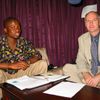OP-ED: Africa's "communications revolution" has fundamentally changed the continent
Telecoms, internet and media consultant and author Russell Southwood outlines how and why the ongoing digital transformation of Africa's communications sector has revolutionised life for everyday people on the continent.

When I started to write Africa 2.0 – Inside a continent's communications revolution, I wanted to look at the impact of mobile calling and the internet on Sub-Saharan Africa, which is arguably one of the biggest economic and social development stories of the last two decades on the continent. Anyone thinking about how Africa might be different in the future must take a long view of the past before turning toward what the future might hold.
People in tech do not always appreciate that human behaviour often changes much more slowly than the rate of new technology development. The book charts a human story because Africans have always defined how they have used technologies and chosen certain kinds over others. A great deal has been written about the huge changes brought about by mobile voice, but arguably the internet will have a more profound impact in the long term. So the book looks at the 35-year-long arc of change that involves both mobile and the internet.
The fuse was lit for this revolution by the introduction of liberalization. Before this occurred, communications was a state monopoly. For example, in 1986 in DRC, before mobile phones, there were 24,000 fixed lines for a country which then had a population of 30 million people: most of these phones worked very badly. In Ghana, a study into its Government-owned telco in 1992 concluded that "the company could not accurately determine who had paid its bills." In one of the first battles to change things, Zimbabwean Strive Masiywa took on the country's state monopoly and won, opening the gates to mobile phone use.
Demand was so intense in one country that the police had to be called to push back the crowds. Pre-paid calling kicked open the door of mass-market use and is almost a case study in how to address 'bottom-of-the-pyramid' markets. Creating internet access was much harder and involved tackling more complicated barriers than were experienced by those rolling out voice: these included anything and everything from monopoly international cables to the lack of low-price national wholesale fibre capacity, the absence of 'last-mile' fibre networks in urban areas and the near complete lack of rural infrastructure.
Overall, liberalization brought new wealth to mobile operators, the wider business community and governments. African startups took advantage of growing internet access to tackle commercial and social opportunities. The idea of rising economic 'success' that the industry fostered drew in other investors.
It also provided a more competitive and cheaper means of bringing home Diaspora funds, which were larger than those from international donors. This applied equally to Basotho miners in South Africa or Burkinabe seasonal cocoa workers in Cote d'Ivoire. In 2020, the number of registered mobile money accounts in sub-Saharan Africa reached 548 million, of which 159 million were active accounts.
The sector became the largest generator of foreign investment after the oil and gas industry. But the impact of these investments differed from what had gone before. They generated more jobs and a wider range of skills. Multinational and local cadres of skilled Africans grew as operators expanded.
The communications revolution has begun to change attitudes toward business and what can be achieved by investment. Its regulatory processes – whether good, bad or indifferent – opened up business opportunities for more than the 'friends of the President'. The tightly controlled form of 'patronage capitalism' has often been the source of much corruption. As one interviewee told me: "We were a country with one TV station, one President and a telecoms company that controlled monopoly access. The internet was the direct opposite of what we had on the ground."
The arrival of venture capital and supportive funds from development organizations investing in online startups has also begun to create greater levels of local capital. It has the potential to break some part of the stranglehold of 'patronage capitalism'.
Mobile operators were, for many years, the biggest advertising spenders, and this fuelled the growth of Africa's newly privatized broadcasters. Mobile internet and social media gave many Africans wider access to news, information and entertainment. The new digital space often grew free from state control, posing increased problems for Africa's ruling elites.
This revolution has not just been an economic phenomenon but also a social one. Mobile phones epitomized a sense of rising expectations, and the aspirational messages of mobile operators provided a narrative and backdrop that chimed with a period of considerable change. As one study found, the mobile was seen as 'an object of desire and a symbol of success.'
But this is an unfinished revolution that has not yet touched all equally. It is very much a function of where someone lives (urban vs peri-urban vs rural), their education (whether they are illiterate, semi-literate, highly literate or indeed technologically illiterate), their gender and what languages they speak. The much-discussed digital divide is, in effect, many different divides, and it is these divides that the continent still has to get to grips with.
What has happened so far might best be described as 'the end of the beginning'. Nevertheless, sub-Saharan Africa's digital future is likely to continue to transform assumptions about what Africans can do and seems to open out a very different future for the continent.
Editorial Disclaimer: The article is part of a Web3 education opinion editorial series resourced by the Celo Community Fund. Opinions expressed by the author do not necessarily reflect the views of the African Tech Roundup or the Celo Community Fund.
SUPPORT US: Value our work? Then, join our Patreon Community and help the African Tech Roundup platform remain single-mindedly focused on serving Africa's tech and innovation ecosystem with robust independent insight and learning content.

